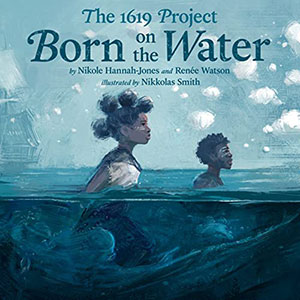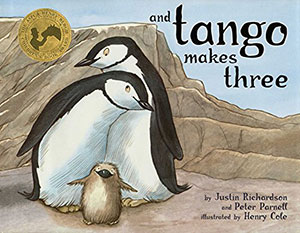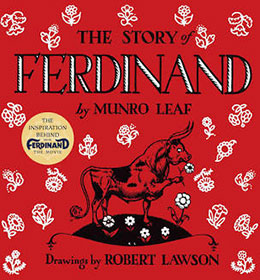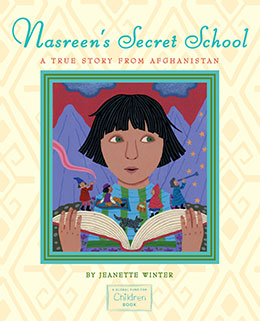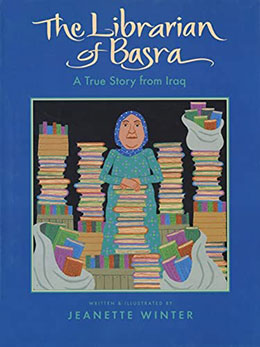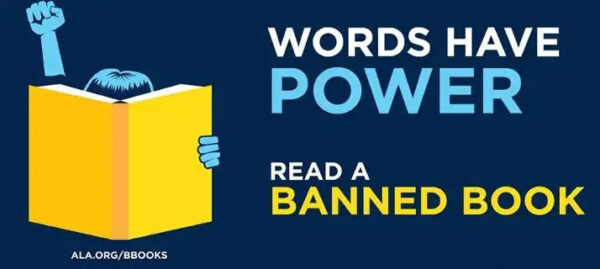
Ellie Roscher: an Introduction
There is a difference between keeping peace and making peace. It is not about avoiding discomfort and trying to keep everybody happy, but bravely joining in the work of justice. At Peace-ology, we explore how to actively build a peaceful world at the personal, interpersonal, institutional, and systemic level.
Books can gently and boldly speak truth to power. Books can challenge minds and shape society. Books help build capacity for compassion and empathy. Books can call us to a higher ground where we live out our ideals and create justice in our communities. Books can bring revolution as water molds rocks one wave at a time. The power of books to usher in peace and justice is evident in our growing list of banned books.
Educators and parents can intentionally pull banned books off the shelf to read and engage with these books with young people. Putting the stories back in circulation is a way of speaking truth to power and amplifying narratives that call for justice and challenge the status quo. We can also talk to kids about banned books. Why does this banned book make folks uncomfortable? Why would people invest time and energy to censor it? Why may it be important for us to read it? Reading banned books and talking about the danger of banning books with kids is the work of peace building.
Caren Stelson: Read Banned Picture Books
According to Pen America, 1,648 unique individual titles have been banned in schools between July 2021 and June 2022. Suzanne Nossel, Chief Executive Officer of PEN America, offers this insight: “While we think of book bans as the work of individual concerned citizens, our report demonstrates that today’s wave of bans represents a coördinated campaign to banish books being waged by sophisticated, ideological and well-resourced advocacy organizations.”
Picture books have not been spared from challenged and banned book lists. Recently published picture books, The 1619 Project: Born on the Water chronicling the slave resistance in the US as well as And Tango Makes Three, the true story of two male penguins raising a chick together, have been banned and taken off the shelves.
Banning books is not new. Remember the picture book The Story of Ferdinand by Munro Leaf, illustrated by Robert Lawson?
First published in 1936 by Viking Press and now a classic, The Story of Ferdinand features a gentle Spanish bull that prefers smelling flowers at home to a starring role in the bull fighting ring.
Released two months after the outbreak of the Spanish Civil War, The Story of Ferdinand ran headlong into a firestorm of culture wars and wartime politics. Francisco Franco of Spain banned the book as a negative pacifist lesson to children. Germany’s Adolf Hitler ordered the book burned. Speaking against oppression and fascism, Ferdinand won praise from Thomas Mann, Eleanor Roosevelt and Gandhi.
The history of Ferdinand is startling, and the jump in the number of books challenged and banned today is frightening. What happens when societies spiral into oppression or war and the freedom to read itself is challenged? Picture book author/illustrator Jeanette Winter reminds us with two of her picture books, Nasreen’s Secret School and The Librarian of Basra.
Nasreen’s Secret School: A True Story from Afghanistan published in 2003 shares the story of a traumatized little girl who has not spoken a word since her father was taken away by the Taliban and her mother disappears in search of her husband. Nasreen and her grandmother are left to survive in a society where women have lost their freedoms and girls are forbidden to go to school. It is up to Nasreen’s grandmother to care for her granddaughter and find the light that will spark Nasreen’s imagination and hope. Stepping through an open door to a secret school, Nasreen steps into a world of books, ideas, and friends. Learning to read gives Nasreen the gift to imagine a more peaceful world no one can take from her.
The Librarian of Basra: A True Story from Iraq published in 2005 is Jennette Winter’s tribute to Alia Muhammad Baker and her fourteen years of service as a librarian for her beloved Iraqi community. When war comes, only Alia worries about the books in the library… The books are in every language — new books, ancient books, even a biography of Muhammad that is seven hundred years old. She asks the governor for permission to move them to a safe place. He refuses.
And so, Alia Muhammad Baker moves all 30,000 books to her house and her friends’ houses. Alia the brave librarian saves her country’s culture by saving the books.
Nasreen’s Secret School and The Librarian of Basra have been challenged by parents in Florida, Michigan, and New York with a call to remove these picture books from the shelves. Why? Because they say these books “promote” another religion besides Christianity and take place in violent settings of Afghanistan and Iraq.
Our librarians here at home, like the Iraqi librarian Alia Muhammad Baker, are trying to save books for children, like Nasreen, who yearn to read and learn. In a recent press release by the American Library Association, librarians have put out a call to action: “Library professionals trust individuals to make their own decisions about what they read and believe. ALA and our partners in the Unite Against Book Bans campaign are asking readers everywhere to stand with us in the fight against censorship.”
Ellie Roscher: The Adult on the Rug
If you want to have a conversation with your students or kids about banned books but feel a little under resources, listen to “Read the Room,” a podcast episode from On the Media. The podcast episode addresses censorship, what it means to ban a book, and who gets to decide what our kids learn. Featured on the episode is a student who brought his school board all the way to the Supreme Court in the ’80s.
In the U.S., there has been a resurgence of parents not only challenging and banning books, but demanding books be pulled from syllabi. It happened to me. When I taught in a Catholic high school a decade ago, the principal pulled The Handmaid’s Tale off my syllabus despite how deeply students engaged with it year in and year out. As parents and educators, it is an important moment to think about truth, censorship, and freedom of speech. It is an important moment to pull banned books off the shelf to read and recognize their power to bring peace into our homes, classrooms, and society.
Click here for American Library Association’s list of banned and challenged books.

